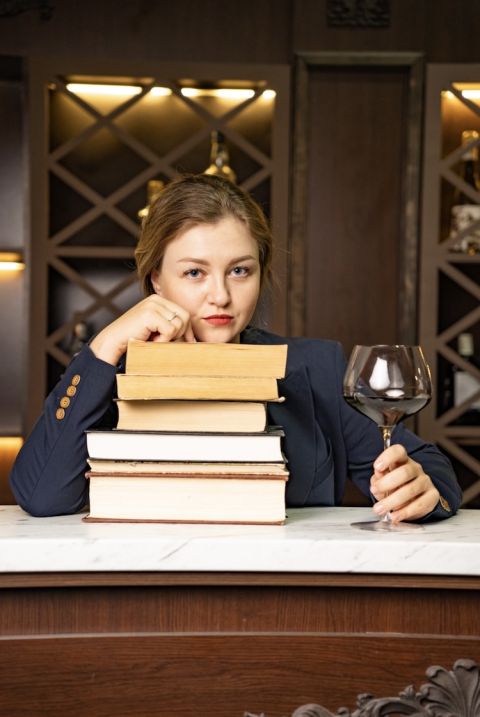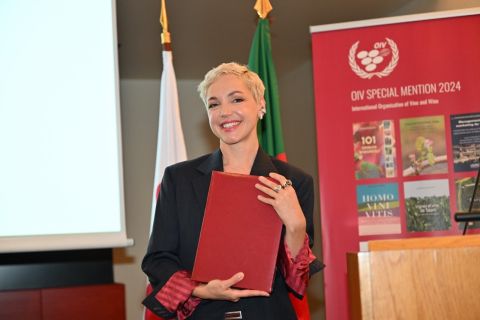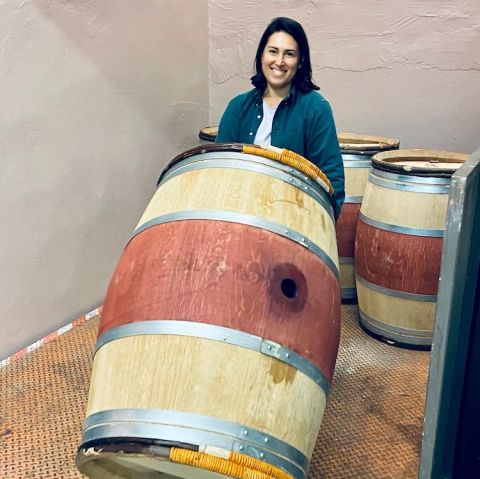It’s difficult to think of any positive outcomes of the war for Ukraine but I can think of one, admittedly minor compared with the terrible damage inflicted on infrastructure, citizens and morale. But as a direct result of the war, not a few Ukrainian wine professionals have been encouraged to travel outside the country and gain experience at some of the world’s best wine estates.
There’s a long history of wine production on the Ukrainian Black Sea and Asov coasts but during the Soviet era such vineyards as remained were required to pump out as much wine as possible, typically sweet, disguising any technical flaws. Just over the western border, however, is Moldova, where vine-growing has long been extremely important, suggesting that this part of the world has real potential.
Crimea was Ukraine’s viticultural gem – until 2014 when it was annexed by Russia. Neverthless there were 134 wineries in Ukraine in 2020, some of them sizeable but an increasing number of them small, ambitious projects. Wine was really catching on in Ukrainian towns and cities with a proliferation of wine bars as the populace switched from vodka.
But then came the Russian invasion of 2022 and this trend came to a resounding halt, not helped by the fact that very early on in the conflict the leading Gostomel glass-bottle factory suffered a direct hit. Ukrainian wine producers have turned to exporting with several specialist importers in the UK and Europe.
Many of us remember the wave of sympathy felt for the country then. Artémis Domaines, the group of top-quality wine estates around the world owned by the family of French entrepreneur François Pinault, decided to offer scholarships specifically to wine professionals who are ‘victims of geopolitical conflict’, which of course initially meant mainly Ukrainians.
Communications and sustainability director Jérémy Cukierman MW comments, 'Training and supporting talent has always been part of the DNA of Artémis Domaines. The majority of the profiles who joined us as interns through these scholarships have demonstrated true enthusiasm and significant commitment. We hope to be able to help others in building their careers in the world of wine.' (Applications for the 2025 Artémis Domaines Golden Vines Scholarships are being sought here.)
So far seven Ukrainians, and one Armenian caught up in the Nagorno-Karabakh conflict of 2020, have been given the chance to intern at the likes of Bordeaux first growth Château Latour, grand cru Clos de Tart and Domaine d’Eugénie in Burgundy, Champagne Jacquesson and Artémis’s two American properties, Eisele Vineyard in Napa Valley and Beaux Frères in Oregon. The wine industries of Ukraine and Armenia can only benefit from this exposure.
After drinking a bottle of Mugnier’s 2011 Musigny, the Armenian, Lilia Khachatryan, who interned at Clos de Tart in Morey-St-Denis, gave up a coveted permanent position with the highly regarded Domaine Anne Gros in Vosne-Romanée in the heartland of Burgundy to return to her native Armenia. She suddenly decided to put into practice all that she had learnt in an effort to make ‘something as grand as Richebourg or Musigny’ from Armenia’s signature grape Areni. She has already shown her first vintage, made with great difficulty from two different grape sources in two different wineries, to Anne Gros, who told me, ‘she showed me some very interesting experiments. I really appreciated it and I wanted to know more.’
But, regrettably, this year’s applications for the scholarships, which close at the end of next month, are likely to have a greater geographical spread. Virtually every wine professional in Lebanon would currently qualify as a victim of geopolitical conflict, for example. Producers in the Bekaa Valley hardly dared venture into their vineyards at harvest time for fear of air strikes. Chateau Rayak winery, halfway between Zahleh and Baalbek, took a direct hit last September during the grape harvest but the owner Elias Maalouf simply cleared the debris, undertook repairs and carried on. As Lebanon’s leading wine writer Michael Karam points out, Lebanon has suffered such a long series of blows that ‘any Lebanese entrepreneur is used to being self-sufficient. They are hot-wired for crisis management’.
He has suggested Abdullah Richi apply for a scholarship. Richi is a former barber and stonemason who fled the Syrian civil war to make wine in Lebanon and now has his own Dar Richi label, making wine in a corner of the Mersel winery that is dedicated to natural wines and reviving ancient Lebanese varieties such as Jouzani and Marini.
Palestinian wine production, centred on the West Bank, was never easy nor copious, but since October 2023 production has plummeted. According to specialist writer on Palestinian wine Jamal Rayyis, growers there feel safe visiting their vineyards only on Saturdays and other Jewish holidays.
Israeli specialist wine writer Adam Sebag Montefiore points out that life has been extremely tough for some Israeli wine producers too.
'On 7 October 2023 Hamas attached the Western Negev of Israel. One winemaker Gideon Pauker, with his own vineyard and domestic winery, was killed in his own home. Three of his partners in the winery were kidnapped as hostages. Two of them, Haim Perry and Yoram Metzger, was murdered in captivity. A third Gadi Mozes is still there in the tunnels of Gaza. We are waiting for him. His wine was saved and produced. Nir Oz Winery. Since Gideon Pauker's death a new vineyard has been planted called Gideon Vineyard and a new winery launched, Pauker Winery.
'On 8 October 2023, Hezbollah attacked Israel focusing on the Galilee and Golan. They bombed Israel every day for over a year. This targeted Israel's wine industry because 40% of Israel's vineyards are in the Galilee and Golan. One winery was destroyed, Avivim Winery in the Upper Galilee. Wineries were on a war footing. Visitors centers closed down for a year. Winery employees in the north were evacuated, with young families living in one room in a hotel for over a year. The damage from eco terrorism was immense. Farmland and forests were destroyed from fires. Some vineyards were destroyed, others damaged. Others were abandoned because it was too dangerous to visit them or because pruning could not take place. The 2023 harvest was interrupted, but most of the whites and some of the reds had already been harvested when the war began. The pruning of the 2023-24 winter and harvest of 2024 was done literally under fire. Very dangerous.
In the 7 October War, many winery workers were called up to serve on Reserve Duty. Israel is not a professional army. Many wineries found themselves without key workers. There were wineries where the winemaking husband was called up, and his wife had to make the wine instead. Many people with connections to wineries have lost their lives unfortunately. All wine sales crashed in the first three months of the war.'
Sommelier Maryna Revkova, above, decided to leave Ukraine in March 2022 when a missile fell so close to her house that it blew out all the doors and windows. Having won several sommelier competitions, she found it relatively easy to find a job with the Symington family in port country in Portugal and then won a scholarship to intern at Château Latour. ‘Such chances are rare’, she emailed recently, ‘and I realised that I had no right to sit and suffer from psychological distress while some of my fellow sommeliers have swapped their corkscrews for guns and are fighting for our independence. But it was hard to realise the dissonance between the calm, measured, restaurant European life and the constant news updates and worrying about my loved ones during the constant shelling.’
With her first grant from the Gérard Basset Foundation, which administers the scholarships, she bought a generator for her relatives in Kyiv, ‘because due to constant power cuts they had no communication, heat and internet’. She has now returned to Ukraine where she’s winemaking director of a new winery near Odesa and is hoping to work the 2025 vintage in New Zealand to gain as much experience as possible. ‘Is it dangerous here? Of course, but we get used to everything.’
The lessons she learnt in in Bordeaux were nor just oenological. ‘From the French, I learnt to manage time and to love life and its quality’, she wrote. Anna Yanchenko, another former Château Latour intern, has also returned to Ukraine, if only on a half-time basis since her husband, born in Belarus, is regarded as an enemy there so is based in Poland at the moment. She is not just a winemaker but also an author who has written an award-winning, comprehensive history of Ukrainian wine, published in English as 29 Centuries. Rediscovered History of Wine in Ukraine (see below). The Ukrainian-language edition was due to be published last May when the publisher was bombed. But, she writes, ‘the publishing house is resilient, and we are now expecting the book to be released this March’. She has also started creating online courses about the history of wine in Ukraine as well as sessions on winemaking. ‘I fear that Ukraine could lose the progress in wine culture it has achieved over the last few decades’, she explained.
She left Ukraine after Russian soldiers put a rocket launcher aimed at ‘my city, Kharkiv’ in her garden. After her return she was invited to give a lecture in a bomb shelter under Kharkiv as part of a music festival. ‘At first I was astonished – a classical piano concert in a bomb shelter? In Kharkiv, a city where bombs fall regularly, sometimes daily or even hourly?’ But, ever the historian, she takes heart from parallels with London during the blitz.
She is organising a competition for Ukrainian wine connoisseurs, giving as prizes the bottles she was given as an intern at Château Latour. ‘This initiative was inspired by moments like one with my colleague, Ivan, who apologised for taking so long to review a chapter of my book – because he was reading it in the trenches.’
Larysa Markevych had been a winemaker at Ukraine’s Kolonist winery before being awarded an internship, and then a full-time job, at Domaine d’Eugénie in Burgundy. She feels very conflicted about being so far from her country but she too has been using bottles of top French wine to help the war effort. By raffling them she managed to raise a third of the cost of a drone needed by one of her two uncles who were then fighting. She writes, ‘The moments when I managed to speak with them or see them on a video call were both invaluable and nerve-racking. I would drop everything at work, whether I was dealing with wine or on the vineyards, and I am grateful to my colleagues for understanding how important that was to me. Each of those conversations can quite literally be the last. That is our reality.’
Georgiy Molchanov was a merchant seaman but now runs the family winery in war-torn southern Ukraine. His scholarship included stints in both Oregon and Napa Valley, where he benefited from a sustainable viticulture course at Grgich Hills, doubtless helpful for the organic principles he has imposed on his small Steppe wine estate. Mines are more common than pesticides here. Mikey Etzel of Beaux Frères in Oregon, where Molchanov mainly interned, reports, 'Georgiy was one of our most memorable additions to the vintage team at Beaux Frères to date. His combination of unique cultural and technical background brought an exchange for our team that made a beautiful mark on all of us.'
Valeria Tenison won not an Artémis Domaines scholarship but a Wine Scholar Guild award from the Gérard Basset Foundation even though in some senses she has been the most displaced by geopolitical conflict. She was living in Russia but felt increasingly uncomfortable there after the Russian annexation of Crimea. Things were also difficult for her Moldovan husband so she moved, after studying for a masters degree in wine tourism in various European locations, to Bordeaux.
She wants to be a Master of Wine and sailed through the first year of studies while running a wine distribution company from St-Émilion. Buying their house was difficult because of sanctions on Russian citizens but they are now established and expecting their first child, with MW studies on hold. ‘I hope, of course, that Russia will change its political system one day, and I will be able to work with Russian producers. I am thinking about writing an MW thesis about Gorbachev's anti-alcohol campaign that drastically affected wine production in the Soviet Union.’
On 24 February 2022 Natalia Homeniuk (above) was woken by the sound of explosions near her home. She and her husband quickly dressed the children, gathered important documents, and drove off. Thanks to an offer of a flat from a Frenchman she met while working as a winemaker in Ukraine, who at the time was working in Argentina, they drove five days to Bordeaux, where they are now settled with her mother. She won a scholarship to intern at Château Latour and so impressed the staff there that she was offered two six-month contracts after her internship. She is in no hurry to return to her homeland but writes, ‘I would really like to stay connected with Ukraine and contribute to it with my new knowledge, as I know how valuable it is to my country at this time.’
The annual growth cycle of the vine was blissfully unaffected by the privations and tragedy associated with the global pandemic. The increasing number of wine professionals affected by war may find some small consolation in the same phenomenon.
I urge you to think seriously about buying wines from Ukraine, Lebanon, Syria, Israel and Palestine while their domestic markets are so compromised. The links above take you to our reviews of wines from those sources. For a wider range of current offerings from Ukraine, see the links below.
Wines from Ukraine (Europe)
Wines from Ukraine (US)

















